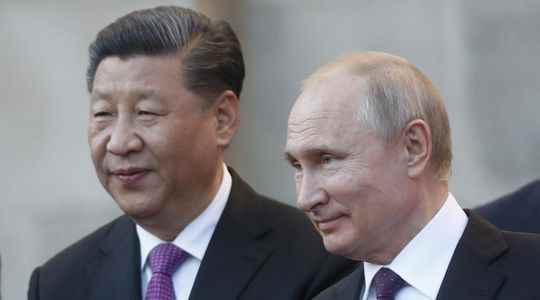On September 5, 1905, the Treaty of Portsmouth, which ended the Russo-Japanese War, marked a defining moment in American history. By deciding to play the role of mediator and by managing to put an end to the conflict between Imperial Russia and the Empire of Japan, American President Theodore Roosevelt definitively affirmed the status of a great power of the United States, which until then had not seen itself only as a power in the making.
Although the circumstances are very different today, the fact remains that it is now up to China to determine whether it is ready to play a real and constructive role in mediation. Admittedly, the economic sanctions imposed on Russia by the West and their allies will accelerate Moscow’s vassalization of Beijing. However, President Putin’s choice to embark on a brutal and unreasonable war poses deep threats to the Chinese regime.
The first of these is that Russian aggression in Ukraine is on the way to putting an end to a global balance which, by its relative stability, has been the breeding ground for Chinese economic success in recent decades. Second, Xi Jinping has no interest in seeing the international order descend into chaos as the 20th Congress of the Chinese Communist Party looms in the fall of 2022, during which he aims to consolidate his power in the long term. Third, each additional day of war reinforces European unity and strengthens NATO, two tendencies perceived by Beijing as going against its interests. Finally, if Russia were to collapse, both economically and institutionally, it could lead to a destabilization of Central Asia, which is as dangerous as it is unpredictable for China.
China has every interest in ending the war
Beyond the humanitarian imperative, there are therefore strategic reasons that should push the Chinese regime to do everything to, while maintaining its strategic partnership with its Russian neighbor, put an end to the war as quickly as possible. in Ukraine. However, there is a notable difference between Theodore Roosevelt’s America and Xi Jinping’s China: the latter cannot play the role of mediator alone. If Beijing has considerable levers of influence on Moscow, the strength of Sino-Russian ties and the conciliatory position towards the Kremlin adopted since the start of the crisis prevent China from being seen as a neutral arbiter. For any mediation to have a chance of success, Beijing therefore has no choice but to conduct it jointly with a Western partner.
At a time when the anti-China obsession transcends partisan divides in Washington and when Sino-American diplomatic channels have considerably diminished in recent years, it seems impossible that the United States can play this role. In this context, a major opportunity is opening up for Europeans.
Because he was able, despite criticism, to maintain a constant channel of communication with the Kremlin and put the European Union back at the heart of the game when it seemed destined to leave, President Macron will have a crucial role to play. . But his leadership can only be effective and counterbalance the weight of Beijing if he goes hand in hand with Chancellor Scholz. Through the historic speech he delivered in the Bundestag on February 27 and because of the ties uniting Berlin to Beijing, the latter has established himself as a key figure in this crisis. In this regard, the meeting which brought together the Chinese, German and French leaders on March 8 could be the prelude to many future meetings in this format.
If there are multiple obstacles but also important question marks – in particular with regard to the nature of the personal relationship uniting Xi to Putin – which will make any Sino-European mediation very difficult, it is a diplomatic option that we we cannot afford to sweep it away.
If it were to be carried out, such mediation would not put an end to the deep differences, even to the distrust and rivalry that have been established between the West and China. But, in the short term, it would allow Beijing to appear again as a responsible player after several years in which the Chinese power locked itself into an aggressive, even threatening attitude. For us Europeans, this would be a new key step so that Europe is perceived and finally perceives itself as a power.
